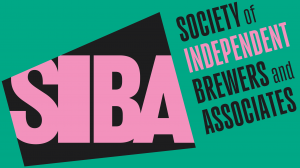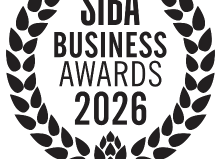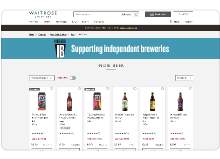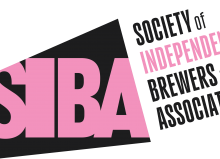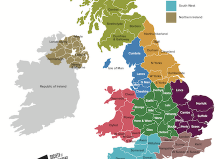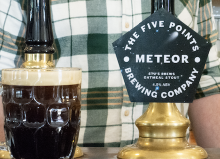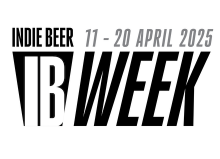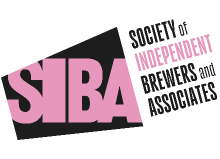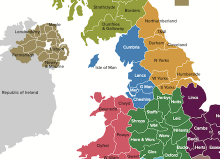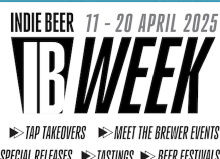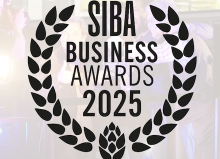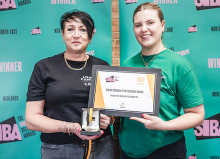Debate on future of Small Breweries Relief sees cross-party calls for Government to change course

In what was an unusually lengthy and impassioned adjournment debate in Parliament last night, the Government faced heavy pressure on its proposed new policy which would hit many small independent breweries across the UK.
The debate was led by Liz Saville-Roberts MP, the Plaid Cymru Member of Parliament for Dwyfor Meirionnydd, who rallied cross-party calls for the Government to change course on Small Breweries Relief. Under Government proposals around 150 small independent breweries would see their tax bill rise and those not immediately effected may see their tax relief eroded over time, as the Government move to an annually reviewed ‘cash basis’ for Small Breweries’ Relief.
“I would like to thank Liz Saville-Roberts MP for leading what was a very well-attended and impassioned debate on this important issue, with a total of sixteen MPs including the Minister speaking. Small breweries in the UK are suffering worse than most due to Covid lockdown measures and have not received the Government’s much-lauded support for the hospitality industry, had access to hospitality grants, or had the business rates holiday extended to them – to now announce tax rises for some of the worst affected businesses shows a disregard for small business in the UK.
MPs from across the UK and both sides of the House spoke about the small independent breweries’ in their constituencies who will suffer under this policy, and I would urge the Government to reconsider its position and commit to no reduction in small breweries relief for those under 5,000hl – the current upper threshold for the full relief rate.” James Calder, SIBA Chief Executive.
“It’s great to see MPs from across the political spectrum speak out about the harmful impact that these changes will have on our small brewers, and on choice for consumers. The strength of feeling on this matter is clear, and CAMRA stands with by the 50,000 concerned consumers who have already signed a petition to Parliament opposing the changes. This is a terrible time to plan to raise taxes for small brewers, and the effects will be disastrous for local and independent brewers, ultimately allowing global brands to further dominate bars across the UK.” Tom Stainer, CAMRA Chief Executive
“The Minister now has the chance to bolster our small breweries, to guarantee their future and to ensure that they can continue to serve their communities, create jobs and support the economy. I urge her to alter course and not to make changes to relief for any brewers below 5,000 hectolitres and not to introduce the cash basis, and by doing so to give hope to all our small breweries, in my constituency and beyond.” Liz Saville-Roberts MP, speaking in the House of Commons last night.
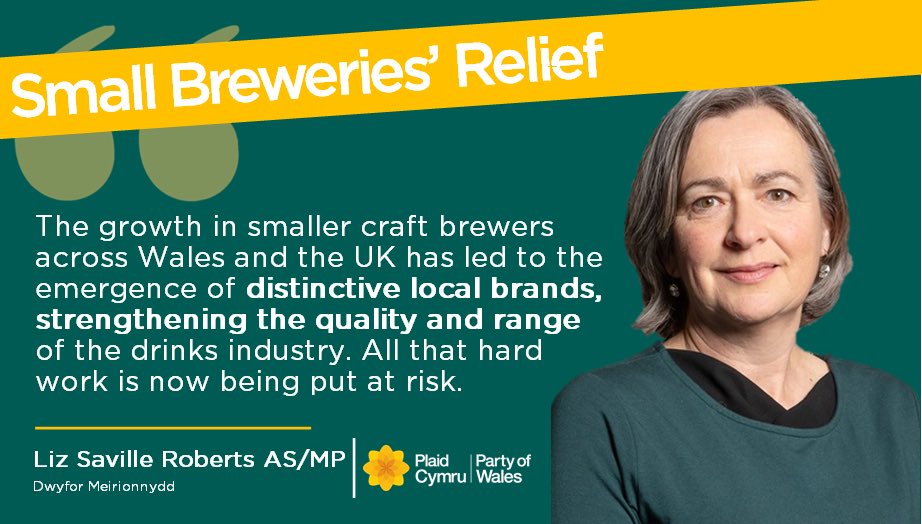
The Society of Independent Brewers (SIBA) and the Campaign for Real Ale (CAMRA) have been working closely on this issue and are fully aligned in their agreement that any changes to ‘smooth the curve’ of Small Breweries’ Relief cannot come at the expense of breweries under the current 5,000hl threshold.
Small Breweries Relief
House of Commons debate 9 November 2020
Liz Saville Roberts MP secured a debate on Small Breweries Relief (SBR) in the House of Commons on Monday where she challenged the Exchequer Secretary on the Government’s rationale for proposing to reduce the 50% rate below 5,000hl and for introducing the cash basis.
The debate was well attending by Parliamentarians with points made by 15 MPs from across the political spectrum and stretched beyond the usual 30 minutes allocated with many small breweries getting mentioned.
Liz Savile Roberts MP said:
- There are around 90 small breweries in Wales including Purple Moose, Cwrw Llyn, Cader Ales, Myrddins Brewery, Bragdy Lleu, Snowdonia Brewery and Cwrw Ogwen.
- These small breweries have to compete against global beer companies and SBR was introduced in 2002 to allow them to compete and to compensate for the lack of market access.
- SBR was introduced because of the poor profitability of small breweries relative to larger ones, the difficulties bringing their goods to market and to maintain diversity within the beer industry.
- Despite the boom, beer consumed in the UK is still produced by a handful of global companies and small breweries only represent about 7% of the beer sold.
- SBR allows independent brewers to pay a proportionate amount of duty to the Treasury like income tax.
- We now have a fantastic variety of beer on offer with the greatest number of breweries since the 1930s.
- SBR has broken the monopoly of production if not yet that of consumption.
- In July the Minister announced that the 50% threshold would be cut to 2,100hl and at least 150 small breweries will see a considerable tax rise.
- The Minister has provided no detail of the changes, no detailed response to the consultation, no impact assessment and no comfort to the small breweries who have no idea how much extra they will have to pay.
- The Government’s decision not to include small breweries in grants and the business rates holiday means that two small breweries a week are closing for good.
- The move to a cash basis means that support offered to all small breweries is under threat.
- There is an alternative to the Treasury’s plans and that is to adopt SIBA’s proposals. The Minister should consider them carefully to support an industry that is responsible for 6000 jobs and contributes £270m a year to GDP.
- She asked the Minister when the technical consultation will be published, if Covid will be taken into account and whether she would meet with a group of MPs to discuss the matter further.
Grahame Morris MP said:
- Mentioned Castle Eden Brewery in his constituency.
- That the changes to SBR will be the death knell for many small breweries across the country.
- He asked the Government not to make any changes to breweries below 5000hl as it threatens the industry and local jobs.
- The move to a cash basis could threaten the long term value of the rate.
- He asked the Minister to admit that the changes will lead to small breweries paying more duty and small breweries closing and how she will judge the success of the policy.
Kemi Badenoch MP (The Exchequer Secretary) said:
- The craft brewing trend is an international phenomenon that predates SBR but SBR has undoubtably helped to encourage new breweries to enter the market and compete against larger and more established businesses.
- The industry asked us to review it. But SBR is not uniformly popular in the brewing sector.
- It is argued that SBR unfairly distorts competition and fails to match the true nature of industry production costs. This penalises the best producers, inhibits growth and disrupts normal business activity. These criticisms have not been made by multinationals but local and mid-sized regional brewers.
- The Treasury announced in 2018 a review and has considered a range of evidence. More information about the evidence will be published as part of the consultation later this year.
- All the evidence suggests that SBR does not match industry production costs. Economies of Scale are rather gradual and do not match the all or nothing approach adopted by the current scheme.
- Some of the evidence suggests there is a growth trap whereby breweries in a certain range enjoy lower production costs than brewers many times their size.
- The amount spent on the scheme has grown from £15m in 2002 to over £65m in 2019 despite beer volumes down over 30% over the same period.
- There are no easy answers and no solution that will make everyone happy.
- The Treasury announced in July that the taper would be withdrawn more gradually over a wider range of production and start at 2,100hl. They also intend to look at transitional relief for breweries that merge and convert it to a cash basis.
- The changes are supported by Lancaster Brewery, Hogs Back and Theakston’s.
- During the review the Government engaged with over 300 breweries of many different sizes.
- 80% of breweries produce less than 2,100hl and only 8% of brewers produce between 2,100-5000hl.
- The reforms will not come into effect until 2022 at the earliest.
- Smoothing the taper above 5000hl would give the large breweries a big advantage at a significant cost to the Exchequer.
- On the cash basis, brewers provided feedback that the relief was not tracking their true production costs and was increasing in value in real terms. A cash basis conversion allows them to review annually the value of the relief, meaning they can track it in line with changes to industry costs.
- The Minister said that she recognised that small breweries have fallen through the cracks and is keeping the support it offers to businesses under review as the pandemic progresses.
- The Minister agrees to meet MPs
- Jim Shannon MP asked about extending Business Rates to breweries and assistance to breweries in Northern Ireland
- Jonathan Edwards MP asked about the larger companies access to Ministers.
- Maria Miller MP raised concerns about the uncertain business environment that small breweries face and that the consultation was carried out at a very different time. She asked that the process be paused to help breweries such as Andwell Brewery. She also asked the Minister how the Treasury will consider production rates when Covid has impacted the industry.
- Alison Thewliss MP mentioned the Wee Beer Shop in her constituency and the support for bottleshops.
- Jane Hunt MP highlighted Charnwood Brewery and that SBR enables businesses to remain viable and to remain small.
- Darren Henry MP said that small breweries are falling through the cracks and referred to Totally Brewed in his constituency and requested clear guidance for small breweries.
- Jonathan Gullis MP highlighted Titanic Brewery which benefitted from SBR and how they find it perverse and the changes are the wrong thing to do
- Duncan Baker MP mentioned Moon Gazer Ales and the impact changes to SBR could have on this business.
- Craig Mackinlay MP made reference to the diversity in the sector and the work of CAMRA and the Ramsgate Brewery.
- Kevin Hollinrake MP said he has met with Bad Seed Brewery and Brass Castle Brewery to discuss SBR and that we also need to avoid any disincentives to grow.
- Elliot Colburn MP referenced Anspach and Hobday and Signal Brewery and argued that now is the wrong time to disincentivise business growth in the sector.
- Ben Lake MP referred to Mantle Brewery and Penlon Brewery and challenged the Minister on the timing of these changes.
- Andrew Jones MP spoke about his previous role as Minister trying to find a solution but it was not possible. He also referred to the export issues faced by small breweries.
